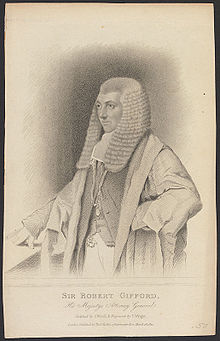Robert Gifford, 1st Baron Gifford
Robert Gifford, 1st Baron Gifford PC (born February 24, 1779 in Exeter , † September 4, 1826 in Dover ) was a British politician and lawyer.
Life
Born as the son of the grocer Robert Gifford and his second wife, Gifford first attended a private school . He later moved to Alphington Elementary School (now part of Exeter ). He became interested in the profession of attorney at an early age and initially completed his training with a lawyer in Exeter. After there was no vacancy for him in his office, Gifford moved to the Middle Temple Inn in 1800 , where he trained with two experienced lawyers. After completing his training, he moved into his own office in 1803 and prepared several years as a special pleader briefs for court proceedings. In February 1808, Gifford was admitted to the bar, specializing in property law cases . As he was very successful here, he was appointed as the successor to Vicary Gibbs to the position of city judge of Bristol in 1812 .
On April 6, 1816, Gibbs married Harriet Maria Drew, the daughter of the pastor of Broadhembury , Devon . The marriage had seven children. In 1817 he was elected to Parliament as a member of the Tory Party and on May 9th that year he was appointed Solicitor General of England and Wales. In the course of this, Georg III raised him . as a Knight Bachelor in the lower nobility. In the elections of 1818 Gifford succeeded again in entering parliament. The following year he was appointed Attorney General . In 1824, he took the position of presiding judge at the Court of Common Pleas and also became a member of the Privy Council . On January 31, 1824, George IV raised him to the higher nobility as Baron Gifford , of St. Leonard in the County of Devon . He thereby became a member of the House of Lords . From 1824 to 1826 he held the post of Master of the Rolls and was also deputy to Lord Chancellor John Scott, 2nd Earl of Eldon .
Gifford was considered his sure successor, but died on September 4, 1826 of cholera . His title passed to his son Robert Francis .
literature
- Charles Mosley (Ed.): Burke's Peerage, Baronetage and Knightage . 107th edition. tape 2 . Boydell & Brewer Inc., Singapore 1993, ISBN 0-9711966-2-1 , pp. 1547 .
- JM Rigg: Gifford, Robert. In: Henry Colin Gray Matthew, Brian Harrison (Eds.): Oxford Dictionary of National Biography , from the earliest times to the year 2000 (ODNB). Volume 22: Gibbes-Gospatric. Oxford University Press, Oxford 2004, ISBN 0-19-861372-5 , ( oxforddnb.com ), as of 2004, accessed June 12, 2013.
Web links
- Robert Gifford at Hansard (English)
- Robert Gifford, 1st Baron Gifford of St. Leonard's on thepeerage.com , accessed August 20, 2015.
- Profile on Family Search
Individual evidence
- ↑ a b cf. ODNB
- ↑ London Gazette . No. 17997, HMSO, London, January 31, 1824, p. 170 ( PDF , English).
| predecessor | Office | successor |
|---|---|---|
| New title created |
Baron Gifford 1824-1826 |
Robert Gifford |
| Thomas Plumer |
Master of the Rolls 1824-1826 |
John Singleton Copley, 1st Baron Lyndhurst |
| personal data | |
|---|---|
| SURNAME | Gifford, Robert, 1st Baron Gifford |
| ALTERNATIVE NAMES | Gifford, Robert Gifford |
| BRIEF DESCRIPTION | British lawyer and politician, Member of the House of Commons |
| DATE OF BIRTH | February 24, 1779 |
| PLACE OF BIRTH | Exeter |
| DATE OF DEATH | September 4, 1826 |
| Place of death | Dover |
